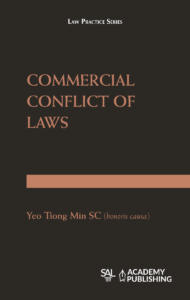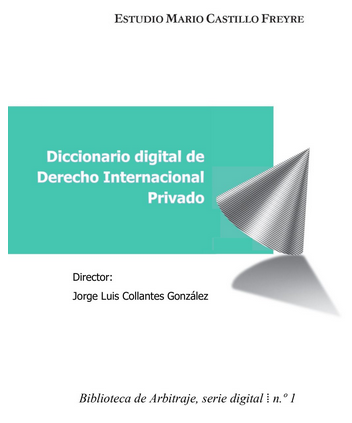Views
Krombach: The Final Curtain
Readers of this blog may be interested to learn that the well-known (and, in many ways, quite depressing) Krombach/Bamberski saga appears to have finally found its conclusion with a decision by the European Court of Human Rights (Krombach v France, App no 67521/14) that was given yesterday. Read more
Cross-border Human Rights and Environmental Damages Litigation in Europe: Recent Case Law in the UK
Over the last few years, litigation in European courts against gross human rights violations and widespread environmental disasters has intensified. Recent case law shows that victims domiciled in third States often attempt to sue the local subsidiary and/or its parent company in Europe, which corresponds to the place where the latter is seated. In light of this, national courts of the EU have been asked to determine whether the parent company located in a Member State may serve as an anchor defendant for claims against its subsidiary – sometimes with success, sometimes not:
For example, in Okpabi & Ors v Royal Dutch Shell Plc & Anor, the English High Court, Queen’s Bench Division, by its Technology and Construction Court, decided that it had no international jurisdiction to hear claims in tort against the Nigerian subsidiary (SPDC) of Royal Dutch Shell (RDC) in connection with environmental and health damages due to oil pollution in the context of the group’s oil production in Nigeria. To be more specific, Justice Fraser concluded that the Court lacked jurisdiction over the action, inasmuch as the European parent company did not owe a duty of care towards the claimants following the test established in Caparo Industries Plc v Dickman. Under the Caparo-test, a duty of care exists where the damage was foreseeable for the (anchor) defendant; imposing a duty of care on it must be fair, just, and reasonable; and finally, there is a certain proximity between the parent company and its subsidiary, which shows that the first exercises a sufficient control over the latter.
On 14 February 2018, the Court of Appeal validated the first instance Court’s reasoning by rejecting the claimants appeal (the judgment is available here). In a majority opinion (Justice Sales dissenting), the second instance Court confirmed that the victims’ claims had no prospect of success. Nevertheless, Justice Simon provided a different assessment of the proximity requirement: after analysing the corporate documents of the parent company, he observed that RDS had established standardised policies among the Shell group. According to the Court, however, this did not demonstrate that RDS actually exercised control over the subsidiary. At paragraph 89 of the judgment, Justice Simon states that it is “important to distinguish between a parent company which controls, or shares control of, the material operations on the one hand, and a parent company which issues mandatory policies and standards which are intended to apply throughout a group of companies (…). The issuing of mandatory policies plainly cannot mean that a parent has taken control of the operations of a subsidiary (…) such as to give rise to a duty of care”. Therefore, the Court of Appeal set a relatively high jurisdictional threshold that will be difficult for claimants to pass in the future.
Conversely, in Lungowe v Vedanta, a case that involved a claim against a parent company (Vedanta) seated in the UK and its foreign subsidiary for the pollution of the Kafue River in Zambia, as well as the adverse consequences of such an occurrence on the local population, the Court of Appeal concluded that there was a real issue to be tried against the parent company. Moreover, the Court considered that the subsidiary was a necessary and proper party to claim and that England and Wales was the proper place in which to bring the claims. Apparently, this case involved greater proximity between the parent company and its subsidiary compared to Okpabi. In particular, the fact that Vedanta hold 80% of its subsidiary’ shares played an important role. The same can be said as regards the degree of control of Vedanta’s board over the activities of the subsidiary (see the analysis of Sir Geoffrey Vos at paragraph 197 of the Okpabi appeal).
Unsatisfied with the current landscape, some States adopted –or are in the process of adopting– legislations that establish or reinforce the duty of care or vigilance of parent companies directly towards victims. In particular, France adopted the Duty of Vigilance Law in 2017, according to which parent companies of a certain size have a legal obligation to establish a vigilance plan (plan de vigilance) in order to prevent human rights violations. The failure to implement such a plan will incur the liability of parent companies for damages that a well-executed plan could have avoided. In Switzerland, a proposal of amendment of the Constitution was recently launched, the goal of which consists in reinforcing the protection of human rights by imposing a duty of due diligence on companies domiciled in Switzerland. Notably, the text establishes that the obligations designated by the proposed amendment will subsist even where conflict of law rules designate a different law than the Swiss one (overriding mandatory provision). Finally, some other States, such as Germany, propose voluntary measures through the adoption of a National Action Plan, as this was suggested by the EU in its CSR Strategy.
For further thoughts see Matthias Weller / Alexia Pato, “Local Parents as ‘Anchor Defendants’ in European Courts for Claims against Their Foreign Subsidiaries in Human Rights and Environmental Damages Litigation: Recent Case Law and Legislative Trends” forthcoming in Uniform Law Review 2018, Issue 2, preprint available at SSRN.
Draft Withdrawal Agreement, Continued
It is not quite orthodox to follow on oneself’s post, but I decided to make it as a short answer to some emails I got since yesterday. I do not know why Article 63 has not been agreed upon, although if I had to bet I would say: too complicated a provision. There is much too much in there, in a much too synthetic form; per se this does not necessarily lead to a bad outcome , but here… it looks like, rather. Just an example: Article 63 refers sometimes to provisions, some other to Chapters, and some to complete Regulations. Does it mean that “provisions regarding jurisdiction” are just the grounds for jurisdiction, without the lis pendens rules (for instance), although they are in the same Chapter of Brussels I bis?
One may also wonder why a separate rule on the assessment of the legal force of agreements of jurisdiction or choice of court agreements concluded before the end of the transition period in civil and commercial matters (Regulation 1215/2912) and maintenance (Regulation 4/2009): does the reference to “provisions regarding jurisdiction” not cover them already? Indeed, it may just be a reminder for the sake of clarity; but taken literally it could lead to some weird conclusions, such as the Brussels I Regulation taken preference over the 2005 Hague Convention “in the United Kingdom, as well as in the Member States in situations involving the United Kingdom”, whatever these may be. Of course I do not believe this is correct.
At any rate, for me the most complicated issue lies with the Draft Withdrawal Agreement provisions regarding time. As I already explained yesterday, according to Article 168 “Parts Two and Three, with the exception of Articles 17a, 30(1), 40, and 92(1), as well as Title I of Part Six and Articles 162, 163 and 164, shall apply as from the end of the transition period”, fixed for December 31st, 2020 (Article 121). In the meantime, ex Article 122, Union Law applies, in its entirety (for no exception is made affecting Title VI of Part Three). What are the consequences? Following an email exchange with Prof. Heredia, Universidad Autónoma de Madrid, let’s imagine the case of independent territorial insolvency proceedings – Article 3.2 Regulation 2015/848: if opened before December 31st, 2020, they shall be subject to the Insolvency Regulation. If main proceedings are opened before that date as well, the territorial independent proceedings shall become secondary insolvency proceedings – Article 3.4 Insolvency Regulation. If the main proceedings happen to be opened on January 2nd, 2021, they shall not – Article 63.4 c) combined with Article 168 Draft Withdrawal Agreement (I am still discussing Articles 122 and 168 with Prof. Heredia).
Another not so easy task is to explain Article 63.1 in the light of Articles 122 and 168. The assessment of jurisdiction for a contractual claim filed before the end of the transition period will be made according to Union Law, if jurisdiction is contested or examined ex officio before December 31st, 2020; and according to the provisions regarding jurisdiction of Regulation 1215/2012 (or the applicable one, depending on the subject matter, see Article 63.1 b, c, d) Draft Withdrawal Agreement, if it -the assessment- happens later. Here my question would be, what situations does the author of the Draft have in mind? Does Article 63.1 set up a kind of perpetuatio iurisdictionis rule, so as to ensure that the same rules will apply when jurisdiction is contested at the first instance before the end of the transition period, and on appeal afterwards (or even only afterwards, where it is possible)? Or is it a rule to be applied at the stage of recognition and enforcement where the application therefor is presented after the end of the transition period (but wouldn’t this fall under the scope of Article 63.3)?
That is all for now – was not a short answer, after all, and certainly not the end of it.
(Addenda: as for the UK, on 13 July 2017, the Government introduced the Withdrawal Bill to the House of Commons. On 17 January 2018, the Bill was given a Third Reading and passed through the House of Commons. Full text of the Bill as introduced and further versions of the Bill as it is reprinted to incorporate amendments (proposals for change) made during its passage through Parliament are available here. The Bill aims at converting existing direct EU law, including EU regulations and directly effective decisions, as it applies in the UK at the date of exit, into domestic law.)
News
August 2023 Update: List of China’s Cases on Recognition of Foreign Judgments
Written by Dr. Meng Yu and Dr. Guodong Du, co-founders of China Justice Observer*
On 20 August 2023, China Justice Observer released the 2023 version of List of China’s Cases on Recognition of Foreign Judgments. To date, we have collected 98 cases involving China and 25 foreign States and regions. (Note: Foreign divorce judgments are excluded in the Case List.)
Diccionario digital de Derecho Internacional Privado in open access
Diccionario digital de Derecho Internacional Privado contains no less than 1522 pages in the Spanish language dedicated to analysis of crucial notions in private international law. Each notion is explained in length and accompanies with bibliographic references.
This electronic publication is edited by Jorge Luis Collantes González and features contributions by many private international law authors. It may be downloaded free of charge here.
New Book: “Commercial Conflict of Laws” by Yeo Tiong Min
Professor Yeo Tiong Min (Singapore Management University – Yong Pung How School of Law) has recently published a seminal book entitled “Commercial Conflict of Laws” (Academy Publishing, 2023).

The book aims to introduce readers to “the concept, principles and techniques of the common law of Singapore in dealing with problems in the conflict of laws, with an emphasis on cross-border commercial transactions” (p. v). The book consists of 14 chapters dealing with the core issues of private international law (conflict of laws), i.e. international jurisdiction (Chapters 2 to 7), foreign judgments (Chapters 8 to 10) and choice of law (Chapters 11 to 14).



